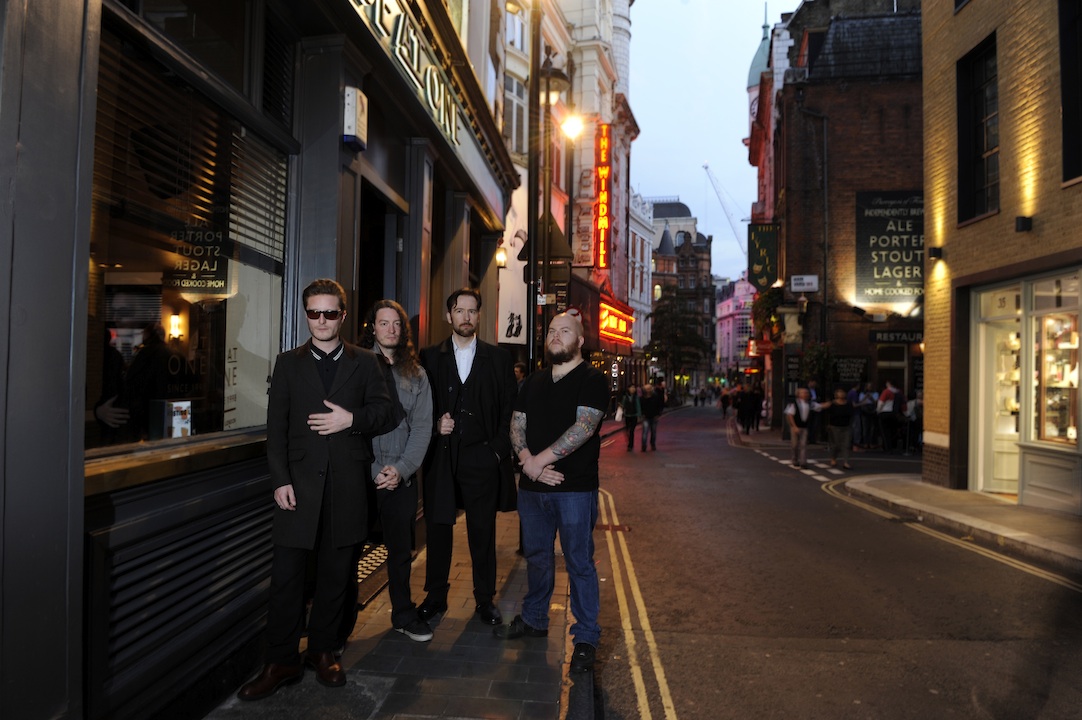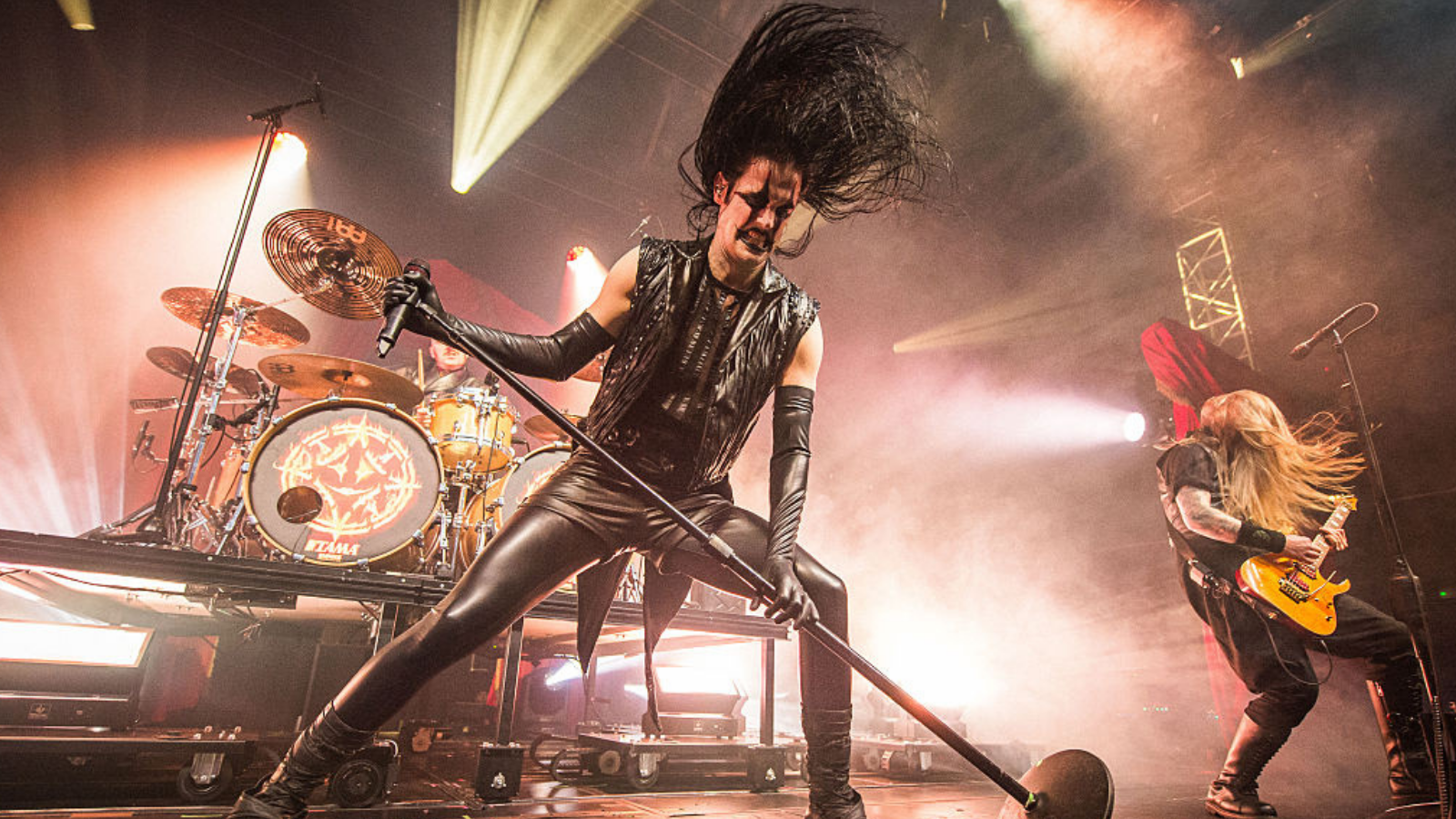Voices: Capital Punishment
Ambitious, artful, fearless and formed from the ashes of Akercocke, Voices have captured the all-encompassing extremity of our greatest city.

Select the newsletters you’d like to receive. Then, add your email to sign up.
You are now subscribed
Your newsletter sign-up was successful
Want to add more newsletters?

Every Friday
Louder
Louder’s weekly newsletter is jam-packed with the team’s personal highlights from the last seven days, including features, breaking news, reviews and tons of juicy exclusives from the world of alternative music.

Every Friday
Classic Rock
The Classic Rock newsletter is an essential read for the discerning rock fan. Every week we bring you the news, reviews and the very best features and interviews from our extensive archive. Written by rock fans for rock fans.

Every Friday
Metal Hammer
For the last four decades Metal Hammer has been the world’s greatest metal magazine. Created by metalheads for metalheads, ‘Hammer takes you behind the scenes, closer to the action, and nearer to the bands that you love the most.

Every Friday
Prog
The Prog newsletter brings you the very best of Prog Magazine and our website, every Friday. We'll deliver you the very latest news from the Prog universe, informative features and archive material from Prog’s impressive vault.
Its streets may be as strewn with bullshit, banality and broken dreams as they are with gold, glory or good times, but no one can credibly deny that London is a city of incalculable significance, both at home and on a global scale.
Even for those of us – this writer included – who have never lived there, it represents far more than simply a densely populated conurbation of residencies and businesses. It’s where millions of lives teeter on the scales of fortune, sending ripples across the rest of the country and beyond. It’s also the place where the majority of British (and other) people go when they want to dedicate their lives to matters of an artistic or creative nature, its bewitching lights, noise and glamour dispensing a scattershot allure that draws questing souls like moths to a flame. As a result, when Voices elected to name their second album, London, they could hardly be accused of aiming low or indicating a lack of bravery. An audacious quantum leap into the compositional unknown, particularly in contrast to their raw and immersive but intermittently timid debut, From The Human Forest Create A Fugue Of Imaginary Rain, the new album doesn’t just live up to the colossal scope and depth of its chosen title: it somehow surpasses it, conjuring a vivid, absorbing and frequently surreal through the streets of our nation’s capital, as seen through the eyes of a spiritual impoverished antihero and told via some of the most ridiculously diverse and daring extreme metal you will hear in this or indeed any other year./o:p
“I think it is ambitious,” states David Gray, Voices’ drummer and, as with guitarists Sam Loynes and Peter Benjamin, a former member of much hailed Satanic eccentrics Akercocke. “I had this deliberate idea about really pushing the limits of the band and, in turn, that really does make you aware of your limitations as a band. At first we were trying to be cinematic and pondered what the visual inspiration for the songs would be. I really wanted it to be so much more than the first one. It’s really difficult to find words for it. I think we were a bit lazy on the debut. But trying to be ambitious on this album, it does make you aware of how far you can push it and exactly what your artillery is and what can you really do.”/o:p
“There are all sorts of limitations, but we perceive them more as hurdles rather than something that could stop you from achieving those ambitions,” adds Sam. “I’m really genuinely loving this record and that’s a great feeling to have, but I still sit here and worry about the future. How are we going to top it?”/o:p

"Helvetica Neue";mso-ansi-language:EN-US;mso-fareast-language:EN-US”>“If you > were really influenced by The Beatles then you’d probably sound like Voices”
Sam’s curiosity about the challenges that lie ahead are understandable when faced with the sheer widescreen vitality of London, an album that adds countless textures and tones to Voices’ already fairly adventurous sound while throwing spoken word narrative interludes, unsettling urban ambience and a whole host of unexpected stylistic detours into their collective cauldron. Purposefully channelling the dark disquiet and rudderless, amorphous realities of JG Ballard’s greatest fiction through a robust but labyrinthine tale of their own creation, Voices have brilliantly encapsulated the unnerving chaos of London’s multitude emotional strata and the dizzying density of its human interactions, with the added bonus of gleefully generous doses of caco-daemonic blasting and scabrous post-punk hostility around which the web of intrigue and dismay are woven./o:p
“We did want to make it a concept album. It was quite deliberate,” David states. “You have a lot of black metal bands that are very culturally-based and possibly even racist as a result. If you consider London to be this animal, a kind of creature, and this is just my opinion, but London is multinational. It’s multicultural. You go out to small towns and the provinces and you hear about this English or British cultural identity and I do believe that exists there, but I don’t believe it exists in London. That London is dead. It doesn’t exist. I think it’s fascinating to think of London in those terms. Most of the people that live or exist in London, come from outside and that’s reality. It’s the truth. So we had this idea of a disaffected pseudo-hero who can’t communicate his feelings and he’s a bit of an outsider. We had this picture of a JG Ballard-esque, high rise, grey existence and a sense of isolation for the pseudo-hero to have, and the only real human contact that he understands is with a prostitute. The only time he ever touches another human, the only time he really engages with a human is when he pays for it and from that comes this almost demented, frantic obsession.”/o:p
Sign up below to get the latest from Metal Hammer, plus exclusive special offers, direct to your inbox!
The intricacies of London’s hour-long stumble through the detached limbo of their creation’s existence are such that there is nowhere near enough space to dissect or analyse it effectively here, but what is eminently worth emphasising is how coherent, compelling and downright fucking intense the second Voices album is. Progressive in the only sense that really matters, and seeming to mutate and evolve in real time as the album’s central character disintegrates, this is a concept album driven by both the intelligence and the meticulous attention to detail required to ensure that willing participants are wholly submerged in its hallucinatory squall./o:p
“As we wrote it, we related back to concept albums in general,” David continues. “Joe’s Garage by Frank Zappa, the ultimate concept album, has a narrative running through it, so we wanted that, but I also wanted to incorporate [The Who’s] Quadrophenia, which I think is one of the most genius concept albums, but that’s purely on a musical level, so we embraced the idea of recurring themes. And then there is Graham Greene’s novel The End Of The Affair and that was a massive influence at the beginning.”/o:p
“The character of Maurice Bendrix in The End Of The Affair is very similar to our antihero,” adds Sam. “He’s affected by the anxieties of the modern man, living amidst the chaos of the city.”/o:p
An inspired reinvention of their sound, married to a wonderfully cohesive story arc that offers little in the way of hope or happiness for its chief protagonist, London paints Voices as contemporary storytellers par excellence, not to mention one of the few modern extreme metal bands with the necessary gumption and gall to pursue the creative and sonic roads less travelled. In an age where thousands of young metal bands seem perfectly content to look no further than yesterday’s YouTube links for inspiration, the UK’s most idiosyncratic metal band have constructed a devilishly complex paean to the streets where they live, exhibiting a rare fearlessness and ferocity of intent in the process./o:p
“I do believe that extreme music can be incredible,” David concludes. “Years and years ago, Oasis came out and said ‘We’re really influenced by The Beatles’…no, you’re not. You want to sound like The Beatles and there’s a big difference. If you were really influenced by The Beatles then you’d probably sound like Voices, because The Beatles were innovators. They tried new things. They wanted to experiment. A real artist says ‘Adore me because of what I create!’ These days, too many people are just saying ‘Adore me!’ Fuck off! What are you bringing to the table? That’s got nothing to do with artistry or communicating or trying to provoke an emotional response. I’m not knocking anyone because everyone’s trying to make a living, but it’s got nothing to do with music. Let’s get that fucking straight.”/o:p
LONDON IS RELEASED VIA CANDLELIGHT/o:p

Dom Lawson began his inauspicious career as a music journalist in 1999. He wrote for Kerrang! for seven years, before moving to Metal Hammer and Prog Magazine in 2007. His primary interests are heavy metal, progressive rock, coffee, snooker and despair. He is politically homeless and has an excellent beard.
